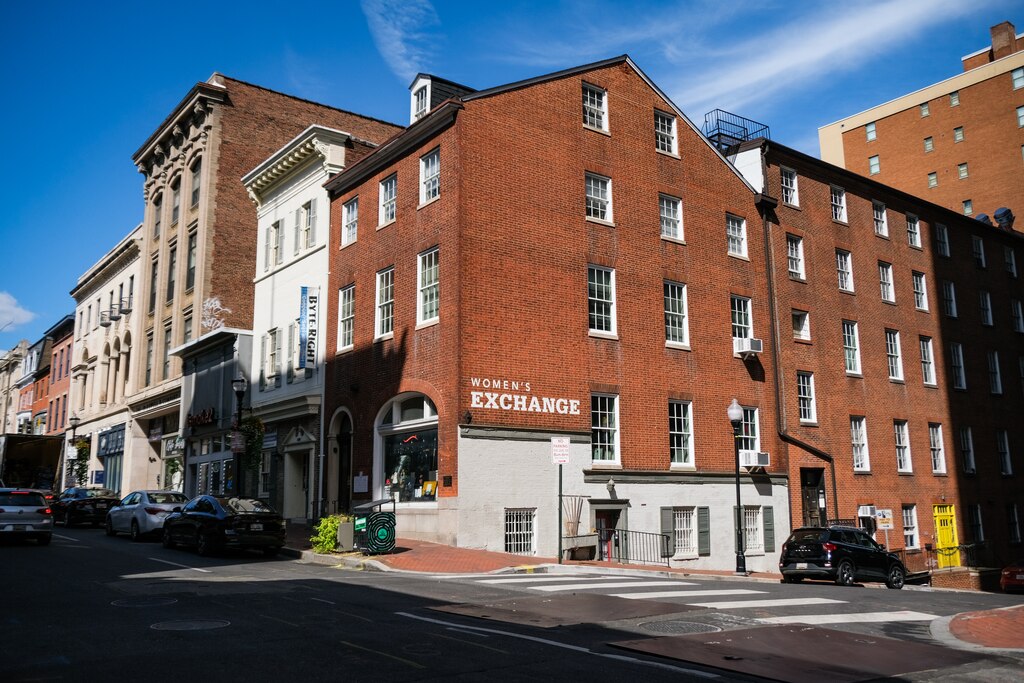The Maryland Women’s Heritage Center, a nonprofit that has strived to preserve the history of women, is dissolving.
Lack of funding and a struggle to find volunteers are among the factors contributing to the group’s demise, said Diana Bailey, the center’s executive director.
The organization is housed at 333 N. Charles St., in the same building as the former Woman’s Industrial Exchange — a place where women could earn a living by selling handwork and baked goods in the late 19th century.
“Our venue honors the unique stories of Maryland’s women and their contributions to the past, present and future,” the heritage center’s website states. “It is the first comprehensive state center of its kind in the nation. We recognize that part of our charge is to help preserve this building’s heritage.”
The industrial exchange permanently closed in 2020 after years of financial troubles and a series of closings and reopenings. The historic building was purchased by Marian House, an organization that provides rehabilitation and housing for women and families, and the Maryland’s Women’s Heritage Center moved in that same year.
The center was a first-class commercial tenant, said Marian House CEO Katie Allston, given the building’s history and the two nonprofits’ shared values.
“It was a perfect match” Allston said. “The Women’s Heritage Center cared so deeply about the building and Marian House.”
Marian House will look to rent the space out again, with the proceeds going toward affordable housing that Marian House offers in the building. While another woman-run business or nonprofit would be “amazing,” Allston said it was important that Charles Street not have an extended period with a vacant storefront.
“We want to keep the community vibrant and the space active,” she said.
A difficult decision
Bailey has been executive director of the Maryland Women’s Heritage Center for about 15 years, she said, and previously served on the board. She’s been involved in women’s groups since college. She thought working with the center would be a short retirement gig after leaving the Maryland State Department of Education, but she stuck around.
Over the years, the center has had a great staff, Bailey said. However, the lack of a livable salary and benefits made it difficult to keep people around for long.
“It just gets difficult when you run a business without full-time staff,” Bailey said.
The center has largely run on grants and donations, Bailey said, but the dollar amounts have gotten smaller and smaller. It once got state funding, but that ended decades ago, she said.
A substantial donation gave the center a boost in 2020, helping support virtual programs and a scholarship. However, Bailey said, rent money eventually became too much to sustain, “and the lease was up in December anyway.”
After brainstorming what else could be done, Bailey and the board made the difficult decision to end the nonprofit.
Still, she takes pride in the legacy that the center will leave, like the 10 suffrage markers that the center brokered for Maryland through the William G. Pomeroy Foundation.
“It was a big deal because it required an excessive amount of serious research, scholarly research,” she said. “And those markers, they’re not going anywhere.”

The center is finding new homes for the artifacts and items that were on display at the North Charles Street site. A piece of art to reflect the late poet Lucielle Clifton, for instance, was returned to The Clifton House.
The center is also organizing an event in October to celebrate the nonprofit. It will be out of the building by December, and Bailey suspects the state will officially dissolve the center in February or March. But the work will continue.
Bailey hopes to partner with the Community Foundation of Howard County to provide small grants for research in women’s history. She also wants to continue to fund scholarships and, hopefully, a women’s history award through Maryland Humanities.
She’s also calling on the public to keep women’s history alive and remain vigilant for any threats, fearing that women’s history could be erased. Her request comes as critics have accused the Trump administration of endangering women’s rights and it has waged a war on diversity, equity and inclusion efforts. It also is seeking to purge “divisive race-centered ideology" from the Smithsonian Institution.
“Women’s history is not just in March — it’s every day and especially these days,” she said. “What impact is not having visibility going to have on the young people in the workforce? In the community?”
Banner reporter Lee O. Sanderlin contributed to this article.




Comments
Welcome to The Banner's subscriber-only commenting community. Please review our community guidelines.